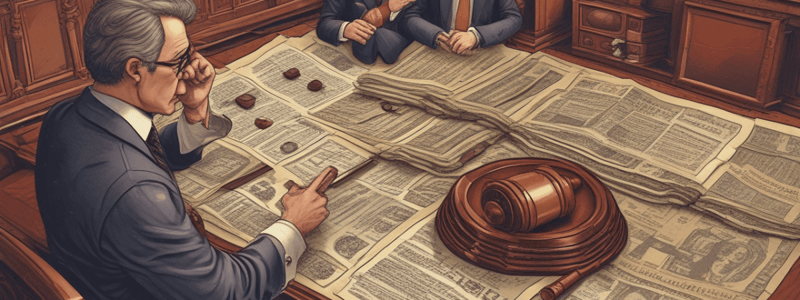Podcast
Questions and Answers
Under what circumstances can deputy sheriffs self-assign an investigation or other action that is not part of their regular assigned duties?
Under what circumstances can deputy sheriffs self-assign an investigation or other action that is not part of their regular assigned duties?
- When they are subpoenaed to testify in a criminal matter
- In emergency circumstances that require immediate action (correct)
- With prior permission from their supervisor
- When they are involved in a civil action
What is the role of employees in civil actions or disputes?
What is the role of employees in civil actions or disputes?
- To provide legal advice to parties involved
- To use their BSO position to intimidate parties involved
- To adjudicate the action or dispute
- To recommend persons seek legal counsel (correct)
What should employees do if they are involved in a civil action arising out of their employment?
What should employees do if they are involved in a civil action arising out of their employment?
- Use their BSO position to intimidate parties involved
- Notify the Sheriff before filing suit (correct)
- Seek legal counsel
- Notify their supervisor immediately
What should employees do if they are sued as a result of an incident arising out of their employment?
What should employees do if they are sued as a result of an incident arising out of their employment?
What is the policy regarding employees' appearance in court?
What is the policy regarding employees' appearance in court?
What should employees do if they are subpoenaed to testify for the defense in a criminal matter?
What should employees do if they are subpoenaed to testify for the defense in a criminal matter?
What is the expectation for employees' demeanor in court?
What is the expectation for employees' demeanor in court?
Who can employees contact if they need legal guidance while testifying in a criminal matter?
Who can employees contact if they need legal guidance while testifying in a criminal matter?
What is the primary reason for permitting an arrangement between a criminal and a victim?
What is the primary reason for permitting an arrangement between a criminal and a victim?
When is it acceptable for an employee to request charges against an arrested person be dismissed?
When is it acceptable for an employee to request charges against an arrested person be dismissed?
What is an example of an exception in the 'interest of justice'?
What is an example of an exception in the 'interest of justice'?
What is prohibited by the policy regarding cases under investigation?
What is prohibited by the policy regarding cases under investigation?
Why must an employee obtain the knowledge and consent of the State Attorney?
Why must an employee obtain the knowledge and consent of the State Attorney?
What is the purpose of the policy regarding the judicial process and cases under investigation?
What is the purpose of the policy regarding the judicial process and cases under investigation?
When can an employee negotiate a compromise with a defendant?
When can an employee negotiate a compromise with a defendant?
What is prohibited by the policy regarding judicial process?
What is prohibited by the policy regarding judicial process?
Flashcards are hidden until you start studying
Study Notes
Judicial Process and Cases Under Investigation
- Employees are prohibited from interfering with the judicial process, including initiating or encouraging agreements between criminals and victims to escape punishment.
- Employees cannot take part in negotiating compromises for defendants to escape punishment, except in the interest of justice and with supervisor approval.
- Employees are not allowed to seek continuances, dismissals, or leniency for defendants, except in the interest of justice and with supervisor approval.
Exceptions in the "Interest of Justice"
- Examples include:
- Strengthening the prosecution of a more serious offender
- Obtaining knowledge and consent of the State Attorney
Interfering with Cases Under Investigation
- Employees are prohibited from interfering with:
- Investigations assigned to other employees
- Operations of other districts, divisions, or sections
- Arrests or prosecutions brought by other employees, agencies, or authorized persons
Self-Assigned Investigations
- Employees are not allowed to self-assign investigations or actions outside their regular duties without supervisor permission
- Exceptions are made for deputy sheriffs in emergency situations, who must notify supervisors and submit a written report as soon as possible
Civil Suits
- Employees are prohibited from:
- Presuming to adjudicate civil actions or giving legal advice
- Using their BSO position to force or intimidate others to settle civil disputes
- Failing to notify the Sheriff before instituting a civil action related to their employment
- Failing to notify their supervisor, Risk Management, and Office of the General Counsel when sued as a result of their employment
Court Demeanor
- Employees must wear official uniforms or civilian clothing conforming to BSO standards in court
- Employees are not allowed to appear in court in a BSO uniform unless testifying as a result of their official duties
- Employees subpoenaed to testify for the defense must notify their supervisor and prosecutor
- Employees must maintain a professional demeanor and appearance in court
Studying That Suits You
Use AI to generate personalized quizzes and flashcards to suit your learning preferences.




